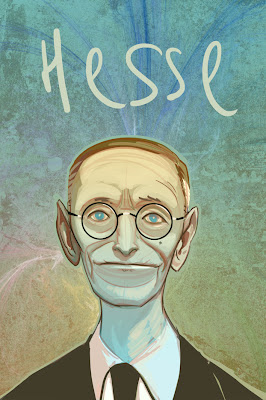El Lobo Estepario es un libro no para leerlo una vez, sino para releerlo y reflexionar sobre ti mismo. El personaje es un ser que escoge la soledad como antídoto contra la masificación y la mediocridad de la vida. No es antipático pero sí antisocial. El personaje en un momento de su vida fue feliz, a través de un matrimonio convencional y burgués. Un día todo eso desaparece y se encierra en sí mismo. Es cuando abomina de la sociedad a la que había pertenecido. Descubre en la soledad lo fácil que es manipular al ser humano. Se percata de cómo el ciudadano no pone esfuerzo alguno en pos de un pensamiento crítico contra el poder. Claro el libro era una critica al surgimiento del nazismo.
El libro de Herman Hesse es de una rabiosa actualidad, mirando la actual situación de Europa, una sociedad tosca y egoísta, donde el futbol y las telebasuras ocupan las rutinarias y envilecidas vidas. El pensamiento de Harry Haller, el protagonista de la novela se sintetiza en anotaciones como esta. <Soledad era independencia, era fría es cierto, pero también era tranquila, maravillosamente tranquila y grande, como el tranquilo espacio frio en que se mueven las estrellas.> También anota, <El hombre no es de ninguna manera un producto firme y duradero, es más bien un ensayo y una transición, no es otra cosa sino el puente estrecho y peligroso entre la naturaleza y el espíritu.>
For those of us with silver hair now, during our adolescence in the past, we were delighted by the beautiful novel Siddhartha by the great Herman Hesse, a novel in which he sang the praises of humanism, in the pursuit of Eastern mysticism. In short the work was a lyrical symphony. In my case however, it always reminds me of his other excellent and unique book which is Der Steppenwolf, a novel that still captivates me today. When I was 17 years old I read it for the first time, but I didn't know how to decipher its contents. Now that I have decided to reread the book, I can identify more with the tormented and central character of the novel, the melancholic and misanthropic Harry Haller.
Der Steppenwolf is a book not to be read just once, but to be re-read and be reflected upon. The character is a being that has chosen solitude as an antidote against the masses and the mediocrity of life. He is not portrayed as unsympathetic but rather antisocial. The character was happy during a point of time in his life, living a conventional life and in a bourgeois marriage. One day all that disappeared and he began to enclose himself and it is when he discovered the abomination of the society in which he was living. In his solitude he realized how easy it was to manipulate human beings. He realized that the citizens of a nation were not prone to employing their devices in pursuit of a critical thinking against the powers that be. The book was clearly a critique of the rise of Nazism.
The book by Herman Hesse is of an astonishing relevance to the current deplorable situation in Europe, where in its crude and selfish societies, soccer and trashy television programming occupy the routine and vile lives of many. The thoughts of Harry Haller, the protagonist of the novel, is synthesized in annotations like the following. <Solitude was independence, it was cold, that is true, but it was also quiet, wonderfully quiet and vast, just like the quiet cold space through which the stars move. > He also noted, <Man is not in any way, a firm and durable product, he is more like an work in progress and a transition, he is none other than another object, the narrow and dangerous bridge between nature and spirit. >



Los grandes libros, amigo Agustín, lo son porque su mensaje resulta imperecedero. Una y otra vez volvemos a ellos, seguros de que siempre hallaremos algo nuevo. Comparto tu opinión con respecto a "El lobo estepario".
ResponderEliminarUn cordial saludo.
hola, Agustín, me encantó el lobo estepario también, felicidades por el buen gusto en rememorarlo
ResponderEliminarsaludos blogueros
No lo he leido, pero era uno de los favoritos de uno de mis hermanos, quizá por un cierto parecido con el personaje.
ResponderEliminarTambién releo El Lobo y otras obras de Hesse que están en su estante, aquí justo detrás de mi cabeza, al alcance de la mano, como vigilando...
ResponderEliminarNo se a ti, pero a mi la relectura de Siddhartha, como que no. De joven me gusto mucho.
ResponderEliminarSaluditos.
Pues a mi me da la sensación de que es un libro que ha superado mal el paso del tiempo y que se ha queddao entre añejo y tranochado.
ResponderEliminarUno de esos libros que Pepe Carvalho, el personaje de Vázquez Montalban, quemaría en la chimenea paladeando un buen vino.